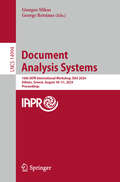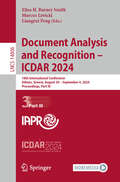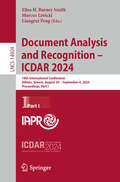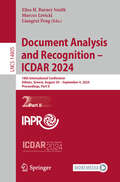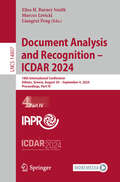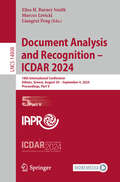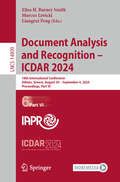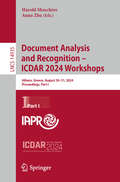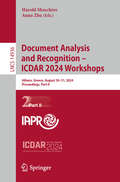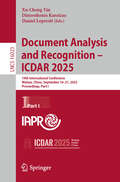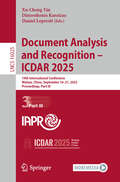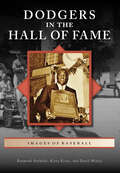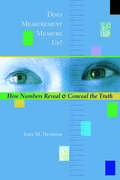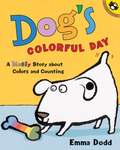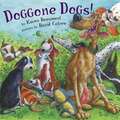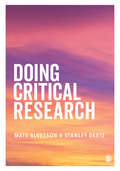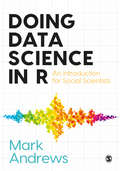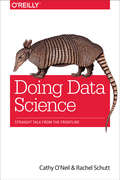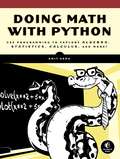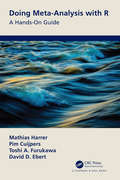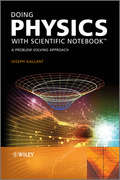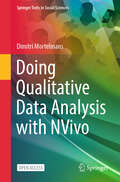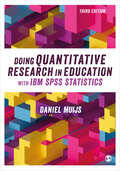- Table View
- List View
Document Analysis Systems: 16th IAPR International Workshop, DAS 2024, Athens, Greece, August 30–31, 2024, Proceedings (Lecture Notes in Computer Science #14994)
by Giorgos Sfikas George RetsinasThis book constitutes the refereed proceedings of the 16th IAPR International Workshop on Document Analysis Systems, DAS 2024, held in Athens, Greece, during August 30-31, 2024. The 27 full papers presented were carefully reviewed and selected from 43 submissions addressing topics like: document analysis and understanding; retrieval and VQA; layout analysis; document classification; OCR correction and NLP; recognition systems; and historical documents.
Document Analysis and Recognition - ICDAR 2024: 18th International Conference, Athens, Greece, August 30 – September 4, 2024, Proceedings, Part III (Lecture Notes in Computer Science #14806)
by Elisa H. Barney Smith Marcus Liwicki Liangrui PengThis six-volume set LNCS 14804-14809 constitutes the proceedings of the 18th International Conference on Document Analysis and Recognition, ICDAR 2024, held in Athens, Greece, during August 30–September 4, 2024. The total of 144 full papers presented in these proceedings were carefully selected from 263 submissions. The papers reflect topics such as: document image processing; physical and logical layout analysis; text and symbol recognition; handwriting recognition; document analysis systems; document classification; indexing and retrieval of documents; document synthesis; extracting document semantics; NLP for document understanding; office automation; graphics recognition; human document interaction; document representation modeling and much more.
Document Analysis and Recognition - ICDAR 2024: 18th International Conference, Athens, Greece, August 30–September 4, 2024, Proceedings, Part I (Lecture Notes in Computer Science #14804)
by Elisa H. Barney Smith Marcus Liwicki Liangrui PengThis six-volume set LNCS 14804-14809 constitutes the proceedings of the 18th International Conference on Document Analysis and Recognition, ICDAR 2024, held in Athens, Greece, during August 30–September 4, 2024. The total of 144 full papers presented in these proceedings were carefully selected from 263 submissions. The papers reflect topics such as: Document image processing; physical and logical layout analysis; text and symbol recognition; handwriting recognition; document analysis systems; document classification; indexing and retrieval of documents; document synthesis; extracting document semantics; NLP for document understanding; office automation; graphics recognition; human document interaction; document representation modeling and much more.
Document Analysis and Recognition - ICDAR 2024: 18th International Conference, Athens, Greece, August 30–September 4, 2024, Proceedings, Part II (Lecture Notes in Computer Science #14805)
by Elisa H. Barney Smith Marcus Liwicki Liangrui PengThis six-volume set LNCS 14804-14809 constitutes the proceedings of the 18th International Conference on Document Analysis and Recognition, ICDAR 2024, held in Athens, Greece, during August 30–September 4, 2024. The total of 144 full papers presented in these proceedings were carefully selected from 263 submissions. The papers reflect topics such as: document image processing; physical and logical layout analysis; text and symbol recognition; handwriting recognition; document analysis systems; document classification; indexing and retrieval of documents; document synthesis; extracting document semantics; NLP for document understanding; office automation; graphics recognition; human document interaction; document representation modeling and much more.
Document Analysis and Recognition - ICDAR 2024: 18th International Conference, Athens, Greece, August 30–September 4, 2024, Proceedings, Part IV (Lecture Notes in Computer Science #14807)
by Elisa H. Barney Smith Marcus Liwicki Liangrui PengThis six-volume set LNCS 14804-14809 constitutes the proceedings of the 18th International Conference on Document Analysis and Recognition, ICDAR 2024, held in Athens, Greece, during August 30–September 4, 2024. The total of 144 full papers presented in these proceedings were carefully selected from 263 submissions. The papers reflect topics such as: document image processing; physical and logical layout analysis; text and symbol recognition; handwriting recognition; document analysis systems; document classification; indexing and retrieval of documents; document synthesis; extracting document semantics; NLP for document understanding; office automation; graphics recognition; human document interaction; document representation modeling and much more.
Document Analysis and Recognition - ICDAR 2024: 18th International Conference, Athens, Greece, August 30–September 4, 2024, Proceedings, Part V (Lecture Notes in Computer Science #14808)
by Elisa H. Barney Smith Marcus Liwicki Liangrui PengThis six-volume set LNCS 14804-14809 constitutes the proceedings of the 18th International Conference on Document Analysis and Recognition, ICDAR 2024, held in Athens, Greece, during August 30–September 4, 2024. The total of 144 full papers presented in these proceedings were carefully selected from 263 submissions. The papers reflect topics such as: document image processing; physical and logical layout analysis; text and symbol recognition; handwriting recognition; document analysis systems; document classification; indexing and retrieval of documents; document synthesis; extracting document semantics; NLP for document understanding; office automation; graphics recognition; human document interaction; document representation modeling and much more.
Document Analysis and Recognition - ICDAR 2024: 18th International Conference, Athens, Greece, August 30–September 4, 2024, Proceedings, Part VI (Lecture Notes in Computer Science #14809)
by Elisa H. Barney Smith Marcus Liwicki Liangrui PengThis six-volume set LNCS 14804-14809 constitutes the proceedings of the 18th International Conference on Document Analysis and Recognition, ICDAR 2024, held in Athens, Greece, during August 30–September 4, 2024. The total of 144 full papers presented in these proceedings were carefully selected from 263 submissions. The papers reflect topics such as: document image processing; physical and logical layout analysis; text and symbol recognition; handwriting recognition; document analysis systems; document classification; indexing and retrieval of documents; document synthesis; extracting document semantics; NLP for document understanding; office automation; graphics recognition; human document interaction; document representation modeling and much more.
Document Analysis and Recognition – ICDAR 2024 Workshops: Athens, Greece, August 30–31, 2024, Proceedings, Part I (Lecture Notes in Computer Science #14935)
by Harold Mouchère Anna ZhuThis two-volume set LNCS 14935-14936 constitutes the proceedings of International Workshops co-located with the 18th International Conference on Document Analysis and Recognition, ICDAR 2024, held in Athens, Greece, during August 30–31, 2024. The total of 30 regular papers presented in these proceedings were carefully selected from 46 submissions. Part I contains 16 regular papers that stem from the following workshops: ICDAR 2024 Workshop on Automatically Domain-Adapted and Personalized Document Analysis (ADAPDA); ICDAR 2024 Workshop on Advanced Analysis and Recognition of Parliamentary Corpora (ARPC); ICDAR 2024 Workshop on coMics ANalysis, Processing and Understanding (MANPU). Part II contains 14 regular papers that stem from the following workshops: ICDAR 2024 Workshop on Computational Paleography (IWCP); ICDAR 2024 Workshop on Machine Vision and NLP for Document Analysis (VINALDO).
Document Analysis and Recognition – ICDAR 2024 Workshops: Athens, Greece, August 30–31, 2024, Proceedings, Part II (Lecture Notes in Computer Science #14936)
by Harold Mouchère Anna ZhuThis two-volume set LNCS 14935-14936 constitutes the proceedings of International Workshops co-located with the 18th International Conference on Document Analysis and Recognition, ICDAR 2024, held in Athens, Greece, during August 30–31, 2024. The total of 30 regular papers presented in these proceedings were carefully selected from 46 submissions. Part I contains 16 regular papers that stem from the following workshops: ICDAR 2024 Workshop on Automatically Domain-Adapted and Personalized Document Analysis (ADAPDA); ICDAR 2024 Workshop on Advanced Analysis and Recognition of Parliamentary Corpora (ARPC); ICDAR 2024 Workshop on coMics ANalysis, Processing and Understanding (MANPU). Part II contains 14 regular papers that stem from the following workshops: ICDAR 2024 Workshop on Computational Paleography (IWCP); ICDAR 2024 Workshop on Machine Vision and NLP for Document Analysis (VINALDO).
Document Analysis and Recognition – ICDAR 2025: 19th International Conference, Wuhan, China, September 16–21, 2025, Proceedings, Part I (Lecture Notes in Computer Science #16023)
by Daniel Lopresti Dimosthenis Karatzas Xu-Cheng YinThe 5-volume set LNCS 16023 - 16027 constitutes the proceedings of the 19th International Conference on Document Analysis and Recognition, ICDAR 2025, which took place in Wuhan, China, during September 2025. The total of 142 full papers included in the proceedings was carefully reviewed and selected from 314 submissions. They were organized in topical sections as follows: Part I: Document Analysis; Handwriting Recognition; Document Synthesis, Multimodal Models for Document Understanding; NLP for Document Understanding; Part II: Historical Document Analysis; Trustworthy Document Analysis Methods and Documentation; Handwriting Recognition; Camera Based Methods and Font Analysis; Part III: Poster Papers; Part IV: Poster Papers; Part V: Poster Papers; Competitions.
Document Analysis and Recognition – ICDAR 2025: 19th International Conference, Wuhan, China, September 16–21, 2025, Proceedings, Part III (Lecture Notes in Computer Science #16025)
by Daniel Lopresti Dimosthenis Karatzas Xu-Cheng YinThe 5-volume set LNCS 16023 - 16027 constitutes the proceedings of the 19th International Conference on Document Analysis and Recognition, ICDAR 2025, which took place in Wuhan, China, during September 2025. The total of 142 full papers included in the proceedings was carefully reviewed and selected from 314 submissions. They were organized in topical sections as follows: Part I: Document Analysis; Handwriting Recognition; Document Synthesis, Multimodal Models for Document Understanding; NLP for Document Understanding; Part II: Historical Document Analysis; Trustworthy Document Analysis Methods and Documentation; Handwriting Recognition; Camera Based Methods and Font Analysis; Part III: Poster Papers; Part IV: Poster Papers; Part V: Poster Papers; Competitions.
Dodgers in the Hall of Fame (Images of Baseball)
by David Hickey Kerry Keene Raymond P. SinibaldiAmong the most successful franchises in the long and glorious history of baseball, the Dodgers have captured 25 pennants and have been crowned world champions seven times; only five teams in history have claimed more World Series titles. The Dodgers are baseball's most transformative franchise. In 1947, Jackie Robinson changed the face of baseball and America. They built Dodgertown in 1948; became the first major-league team to own a plane; and spurred the move west in 1958, where Sandy Koufax redefined pitching dominance. Herein lies the story of the men who have worn Dodger blue on their way to becoming baseball immortals, forever enshrined in Cooperstown's Baseball Hall of Fame.
Does Measurement Measure Up?: How Numbers Reveal and Conceal the Truth
by John M. HenshawA critical perspective of how measurements have come to affect our lives—from reasonable doubt to No Child Left Behind.There was once a time when we could not measure sound, color, blood pressure, or even time. We now find ourselves in the throes of a measurement revolution, from the laboratory to the sports arena, from the classroom to the courtroom, from a strand of DNA to the far reaches of outer space. Measurement controls our lives at work, at school, at home, and even at play. But does all this measurement really measure up? Here, John Henshaw examines the ways in which measurement makes sense or creates nonsense. Henshaw tells the controversial story of intelligence measurement from Plato to Binet to the early days of the SAT to today's super-quantified world of No Child Left Behind. He clears away the fog on issues of measurement in the environment, such as global warming, hurricanes, and tsunamis, and in the world of computers, from digital photos to MRI to the ballot systems used in Florida during the 2000 presidential election. From cycling and car racing to baseball, tennis, and track-and-field, he chronicles the ever-growing role of measurement in sports, raising important questions about performance and the folly of comparing today's athletes to yesterday's records.We can't quite measure everything, at least not yet. What could be more difficult to quantify than reasonable doubt? However, even our justice system is yielding to the measurement revolution with new forensic technologies such as DNA fingerprinting. As we evolve from unquantified ignorance to an imperfect but everpresent state of measured awareness, Henshaw gives us a critical perspective from which we can "measure up" the measurements that have come to affect our lives so greatly.
Dog's Colorful Day: A Messy Story about Colors and Counting
by Emma DoddThe story of a dog that wanders along picking up spots of different colors. Meant for kids to learn numbers and colors the fun way.
Doggone Dogs!
by David Catrow Karen BeaumontFrom the "New York Times"-bestselling creators of "I Ain't Gonna Paint No More!" comes a tail of 10 mischievous, lovable, and delightfully ungainly dogs, who find themselves in one hilarious antic adventure after another.
Doing Critical Research (Sage Series In Management Research Ser.)
by Mats Alvesson Stanley DeetzThis title builds on the success of Doing Critical Management Research which has proven to be a seminal text in the 20 years since publication. In 2020, Alvesson and Deetz have broadened their focus and updated the original book to offer relevance to critical research across all of the social sciences. In reflecting contemporary theoretical and methodological turns over the past few decades, it includes coverage of key contemporary topics such as race, gender, postmodernism and intersectionality. With examples throughout, the authors provide an authoritative and insightful framework for navigating critical theories and methods and sets out a new agenda for critical research undertaken today.
Doing Critical Research (Sage Series In Management Research Ser.)
by Mats Alvesson Stanley DeetzThis title builds on the success of Doing Critical Management Research which has proven to be a seminal text in the 20 years since publication. In 2020, Alvesson and Deetz have broadened their focus and updated the original book to offer relevance to critical research across all of the social sciences. In reflecting contemporary theoretical and methodological turns over the past few decades, it includes coverage of key contemporary topics such as race, gender, postmodernism and intersectionality. With examples throughout, the authors provide an authoritative and insightful framework for navigating critical theories and methods and sets out a new agenda for critical research undertaken today.
Doing Data Science in R: An Introduction for Social Scientists
by Mark AndrewsThis approachable introduction to doing data science in R provides step-by-step advice on using the tools and statistical methods to carry out data analysis. Introducing the fundamentals of data science and R before moving into more advanced topics like Multilevel Models and Probabilistic Modelling with Stan, it builds knowledge and skills gradually. This book: Focuses on providing practical guidance for all aspects, helping readers get to grips with the tools, software, and statistical methods needed to provide the right type and level of analysis their data requires Explores the foundations of data science and breaks down the processes involved, focusing on the link between data science and practical social science skills Introduces R at the outset and includes extensive worked examples and R code every step of the way, ensuring students see the value of R and its connection to methods while providing hands-on practice in the software Provides examples and datasets from different disciplines and locations demonstrate the widespread relevance, possible applications, and impact of data science across the social sciences.
Doing Data Science in R: An Introduction for Social Scientists
by Mark AndrewsThis approachable introduction to doing data science in R provides step-by-step advice on using the tools and statistical methods to carry out data analysis. Introducing the fundamentals of data science and R before moving into more advanced topics like Multilevel Models and Probabilistic Modelling with Stan, it builds knowledge and skills gradually. This book: Focuses on providing practical guidance for all aspects, helping readers get to grips with the tools, software, and statistical methods needed to provide the right type and level of analysis their data requires Explores the foundations of data science and breaks down the processes involved, focusing on the link between data science and practical social science skills Introduces R at the outset and includes extensive worked examples and R code every step of the way, ensuring students see the value of R and its connection to methods while providing hands-on practice in the software Provides examples and datasets from different disciplines and locations demonstrate the widespread relevance, possible applications, and impact of data science across the social sciences.
Doing Data Science: Straight Talk from the Frontline
by Cathy O'Neil Rachel SchuttNow that people are aware that data can make the difference in an election or a business model, data science as an occupation is gaining ground. But how can you get started working in a wide-ranging, interdisciplinary field that’s so clouded in hype? This insightful book, based on Columbia University’s Introduction to Data Science class, tells you what you need to know.In many of these chapter-long lectures, data scientists from companies such as Google, Microsoft, and eBay share new algorithms, methods, and models by presenting case studies and the code they use. If you’re familiar with linear algebra, probability, and statistics, and have programming experience, this book is an ideal introduction to data science.Topics include:Statistical inference, exploratory data analysis, and the data science processAlgorithmsSpam filters, Naive Bayes, and data wranglingLogistic regressionFinancial modelingRecommendation engines and causalityData visualizationSocial networks and data journalismData engineering, MapReduce, Pregel, and HadoopDoing Data Science is collaboration between course instructor Rachel Schutt, Senior VP of Data Science at News Corp, and data science consultant Cathy O’Neil, a senior data scientist at Johnson Research Labs, who attended and blogged about the course.
Doing Math with Python: Use Programming to Explore Algebra, Statistics, Calculus, and More!
by Amit SahaDoing Math with Python shows you how to use Python to delve into high school–level math topics like statistics, geometry, probability, and calculus. You’ll start with simple projects, like a factoring program and a quadratic-equation solver, and then create more complex projects once you’ve gotten the hang of things.Along the way, you’ll discover new ways to explore math and gain valuable programming skills that you’ll use throughout your study of math and computer science. Learn how to:–Describe your data with statistics, and visualize it with line graphs, bar charts, and scatter plots–Explore set theory and probability with programs for coin flips, dicing, and other games of chance–Solve algebra problems using Python’s symbolic math functions–Draw geometric shapes and explore fractals like the Barnsley fern, the Sierpinski triangle, and the Mandelbrot set–Write programs to find derivatives and integrate functionsCreative coding challenges and applied examples help you see how you can put your new math and coding skills into practice. You’ll write an inequality solver, plot gravity’s effect on how far a bullet will travel, shuffle a deck of cards, estimate the area of a circle by throwing 100,000 "darts" at a board, explore the relationship between the Fibonacci sequence and the golden ratio, and more.Whether you’re interested in math but have yet to dip into programming or you’re a teacher looking to bring programming into the classroom, you’ll find that Python makes programming easy and practical. Let Python handle the grunt work while you focus on the math.Uses Python 3
Doing Meta-Analysis with R: A Hands-On Guide
by Mathias Harrer Pim Cuijpers Toshi A. Furukawa David D. EbertDoing Meta-Analysis with R: A Hands-On Guide serves as an accessible introduction on how meta-analyses can be conducted in R. Essential steps for meta-analysis are covered, including calculation and pooling of outcome measures, forest plots, heterogeneity diagnostics, subgroup analyses, meta-regression, methods to control for publication bias, risk of bias assessments and plotting tools. Advanced but highly relevant topics such as network meta-analysis, multi-three-level meta-analyses, Bayesian meta-analysis approaches and SEM meta-analysis are also covered. A companion R package, dmetar, is introduced at the beginning of the guide. It contains data sets and several helper functions for the meta and metafor package used in the guide. The programming and statistical background covered in the book are kept at a non-expert level, making the book widely accessible. Features• Contains two introductory chapters on how to set up an R environment and do basic imports/manipulations of meta-analysis data, including exercises• Describes statistical concepts clearly and concisely before applying them in R• Includes step-by-step guidance through the coding required to perform meta-analyses, and a companion R package for the book
Doing Physics with Scientific Notebook
by Joseph GallantThe goal of this book is to teach undergraduate students how to use Scientific Notebook (SNB) to solve physics problems. SNB software combines word processing and mathematics in standard notation with the power of symbolic computation. As its name implies, SNB can be used as a notebook in which students set up a math or science problem, write and solve equations, and analyze and discuss their results.Written by a physics teacher with over 20 years experience, this text includes topics that have educational value, fit within the typical physics curriculum, and show the benefits of using SNB.This easy-to-read text:Provides step-by-step instructions for using Scientific Notebook (SNB) to solve physics problems Features examples in almost every section to enhance the reader's understanding of the relevant physics and to provide detailed instructions on using SNB Follows the traditional physics curriculum, so it can be used to supplement teaching at all levels of undergraduate physics Includes many problems taken from the author's class notes and research Aimed at undergraduate physics and engineering students, this text teaches readers how to use SNB to solve some everyday physics problems.
Doing Qualitative Data Analysis with NVivo (Springer Texts in Social Sciences)
by Dimitri MortelmansThis open access textbook provides an introduction to the software program NVivo, the most widely used qualitative analysis program. It is a versatile program with an extensive range of accessible analysis tools, flexibly deployable in the diversity of qualitative analysis approaches. Qualitative analysis is almost standard practice today with the help of a software program. Yet there are many misunderstandings about qualitative software. They support the qualitative researcher but never take over their manual and theoretical work. An in-depth understanding of the possibilities of a qualitative software program helps to free up time for the analysis itself. The possibilities of NVivo in this book are approached from a researcher's perspective. That is precisely why gaining efficiency in using the software tools gets a prominent place in the chapters. The author examines basic skills, such as managing data, working with memos and coding qualitative data. This includes textual data (such as transcripts from interviews and focus groups) and audiovisual material (sound, video and images). The book also discusses more advanced analysis tools, such as case coding, queries, AI tools, matrices and models (maps). This textbook is intended for all users of NVivo, both early career researchers and more advanced analysts, who want to further discover the secrets of this software package along the way.
Doing Quantitative Research in Education with IBM SPSS Statistics
by Daniel MuijsThis essential guide for education students and researchers explains how to use quantitative methods for analysing educational data using IBM SPSS Statistics. By using datasets from real-life educational research, it demonstrates key statistical techniques that you will need to know, explaining how each procedure can by run on IBM SPSS Statistics. Datasets discussed in the book are downloadable, allowing you to hone your skills as you read. In this third edition, explanations have been updated with figures and screenshots from SPSS version 28, alongside a range of new research examples and updated further reading. Daniel Muijs is Dean of the Faculty of Education and Society at Academica University of Applied Sciences in Amsterdam.
